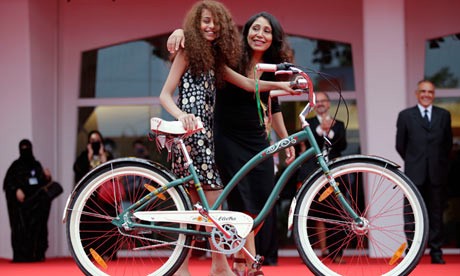The news on the prevalence of women directors coming out out of the Venice Film Festival is in stark contrast to the different conversation that came out of Cannes just several months ago. Festival director Alberto Barbera claims that they just programed the movies and then afterwards realized that about 30% of the movies they picked were directed by women. Here’s what he said:
We did not have a quota for women directors. We chose the films without any prejudices and we realised later that a third were by women.
So does that mean that they did gender blind selection? That as they were watching the movies they did not know who the director was? I find that hard to believe. Because if they did do gender blind selection then every single film festival should go in that direction. We know that works in selecting orchestra members. This could be an interesting way towards getting more women into competitions without any quota conversations.
Aside from the selection issues what Barbera’s comments say is that women ARE making films that can play at the top levels and that there is no excuse for any festival not to program women.
Mira Nair wo is a Venice favorite opened the festival with The Reluctant Fundamentalist and she says she makes movies to tell stories of people like her.
I believe that I have actually been put on this earth to tell stories of people like me, who live between worlds…
The film will also be playing in Toronto.
Two other stories about women directors coming out of Venice include the first Saudi Arabian woman to direct a feature and an Orthodox woman telling a twist on a Jane Austen tale set in an Orthodox jewish community in Israel.
Haifaa al-Mansour went through many challenges to make Wadjda in a country where men and women can’t walk together on the street and women can’t drive. And also movies are illegal. There is not one movie theatre in the whole country. Al-Mansour’s film tells the story of a 10-year old girl who just wants to ride a bike. When she is denied she tries and raise the money herself through a bunch of schemes.
Born in NY, but living in Israel, Rama Burshtein takes us behind the veil of the orthodox world in Fill the Void as a girl just on the cusp of womanhood is faced with the question after her sister dies in childbirth, should she marry her sister’s husband?
Burshtein said she had based the film on a real-life story she heard at a wedding. “I was fascinated. I was asking myself how is that? Is it about feelings? Is it about family? Is it about duty?” she said.
Both films are up for the Golden Lion.
Venice was also the site for the Gucci award for women’s acheivement which long time Scorcese editor Thelma Schoonmaker won. She said women make good editors “because they are more collaborative.”
Women directors take rightful place at Venice film fest (AFP)
Director Mira Nair straddles 2 worlds in Venice opener ‘The Reluctant Fundamentalist’ (AP via Washington Post)
Venice film festival: female film director defies Saudi prejudice (The Guardian)
‘Hugo’ editor Thelma Schoonmaker wins Gucci award (AP)
‘Jane Austen of the Hasidic world’ premieres in Venice (AFP)






